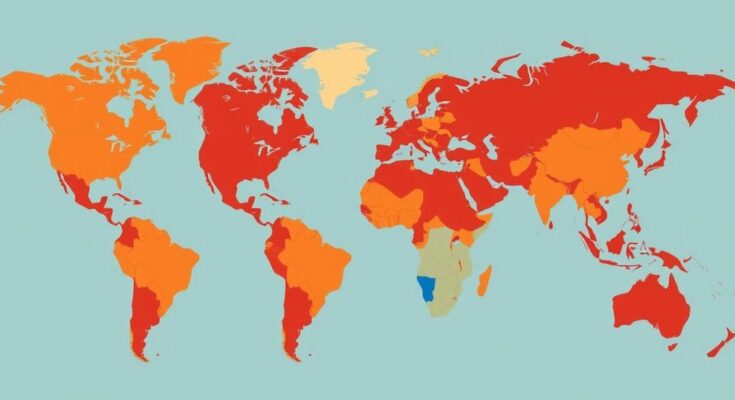The Trump administration is considering a new travel ban that targets up to 43 countries, including a “red” list of 11 countries barred outright from entry and an “orange” list of 10 with restricted travel. This may complicate current visa and immigration processes. While some nations are familiar, others are newly included without clear rationale. The proposal emerges amid an ongoing national security focus.
The Trump administration is reportedly considering a new broader travel ban that could target citizens of up to 43 countries. This proposal is in its early stages, developed by diplomatic and security officials. It features a direct ban on 11 countries, including Afghanistan, Cuba, Iran, Libya, and North Korea, which officials describe as having insufficient vetting and screening procedures for travelers.
Additionally, an “orange” list includes 10 countries subject to restrictions, allowing affluent business travelers entry but requiring mandatory in-person interviews for visa applicants. Those countries are Belarus, Eritrea, Haiti, and others. The advisability of including certain countries may be reconsidered due to diplomatic relations or other policy concerns.
President Trump’s executive order mandates the State Department to identify countries for potential travel restrictions based on security criteria, with a report expected next week. The Bureau of Consular Affairs is leading this initiative, and it is supported by other relevant agencies.
The potential impact on existing visa holders and green card holders remains uncertain. Some countries targeted in the new proposal were previously sanctioned, while others, like Bhutan, are included without clear justification. Additionally, a list of 22 countries could face restrictions unless they remedy perceived deficiencies in their security practices.
Former President Biden had previously revoked Trump’s travel bans, emphasizing a more inclusive approach to immigration. Trump’s administration has indicated a renewed focus on travel restrictions as a measure to protect national security and prevent terrorism.
In summary, the proposed travel ban reflects a continuation of previously established restrictions while seeking to expand its scope, causing significant implications for international relations and immigration policy.
The potential revival of a travel ban targeting citizens from 43 countries highlights ongoing security concerns within the Trump administration. The plan encompasses various lists aimed at restricting travel to the United States, possibly affecting diplomatic relations with several nations. Renewed emphasis on tighter immigration controls and national security protocols suggests a continuation of contentious immigration policies, contrasting sharply with previous administrative approaches. The implications of these recommendations could significantly impact U.S. foreign relations and citizen mobility.
Original Source: risingnepaldaily.com




